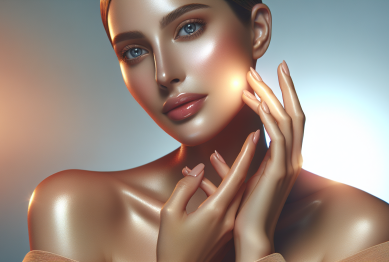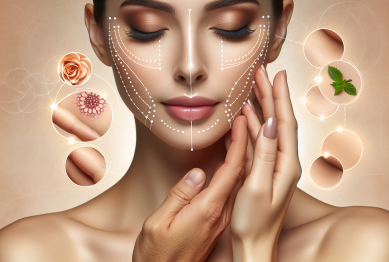Unlock the fascinating world of collagen and radiant skin with this deep dive into natural beauty strategies. Explore how collagen supports your wellness journey, the latest research-backed tips, and lifestyle choices that nurture a lasting glow—without overhyping or making impossible promises.
The Collagen Connection
Collagen sits at the heart of every glowing skin conversation. This incredible protein forms the scaffolding that maintains firmness, elasticity, and smoothness. Over time, however, natural collagen levels decline, sparking interest in nutrition, skincare routines, and lifestyle habits that preserve a plump appearance. While the market brims with collagen-related supplements and serums, not every solution has science on its side. Understanding exactly how collagen interacts with your skin, hair, and nails empowers individuals to find approaches that produce visible, lasting results. Genuine results arrive not through buzzwords, but through steady self-care and informed choices. Learning about collagen’s pivotal role can inspire a more mindful and targeted beauty regimen.
Collagen’s impact isn’t just superficial. Researchers have linked this protein to supporting joint comfort, connective tissue integrity, and even gut lining strength. The multi-layered value of collagen explains its popularity within the wellness and beauty worlds alike (Source: https://www.ncbi.nlm.nih.gov/pmc/articles/PMC6835901/). Nutrition plays a defining role in how well your body is able to produce new collagen. Certain vitamins, especially vitamin C, are vital for synthesis, while a balanced diet packed with antioxidants helps protect existing collagen from damage. Exploring how daily food choices can pay off in long-term resilience yields meaningful benefits beyond quick fixes.
Curiosity about collagen often extends to how its decline speeds up. Ultraviolet exposure, high sugar intake, cigarette smoke, and chronic stress all contribute to faster breakdown. Staying informed about these influences allows people to make tweakable lifestyle shifts that help defend skin structure. For those looking for simple, science-backed steps, prioritizing sun safety, reducing excess sugar, and supporting stress reduction are strong foundations. Small changes, such as embracing hats or sunscreen, serve as daily investments in wellness and beauty, extending that healthy glow from the inside out.
Nutrition for a Youthful Complexion
Radiant skin begins on the plate. Foods rich in vitamin C, zinc, copper, and high-quality proteins act as building blocks for natural collagen synthesis. Citrus fruits, leafy greens, nuts, seeds, beans, and lean seafood all contribute essential nutrients (Source: https://www.hsph.harvard.edu/nutritionsource/vitamin-c/). Collagen’s assembly is complex—one ingredient rarely works in isolation. Combining these nutrients creates an internal environment ripe for repair and renewal. Over time, these dietary strategies support not only surface-level radiance, but also resilience against environmental challenges that often dull the complexion.
Amino acids are foundational for collagen formation. Glycine, proline, and hydroxyproline form its triple-helix structure, and can be found in eggs, poultry, soy, and certain plant foods. Collagen-rich bone broth makes waves for delivering these building blocks in a digestible form, but plant-centric eaters can focus on pulses, seeds, and whole grains to supply what’s needed. Notably, a diet supplying adequate quantities of high-quality protein supports smoother and stronger skin, regardless of age or background. Nutritional approaches to beauty offer flexibility for all lifestyles and preferences.
Antioxidants protect collagen from the destruction caused by free radicals. Colorful fruits and vegetables supply carotenoids and polyphenols, two families of powerful antioxidants that may reduce cellular stress (Source: https://ods.od.nih.gov/factsheets/Antioxidants-Consumer/). For example, tomatoes, bell peppers, and berries can be everyday allies. Over time, this antioxidant shield supports greater longevity of your natural collagen and enhances the skin’s innate glow. Making simple dietary swaps—like choosing vitamin-rich snacks over processed foods—offer profound, cumulative benefits that support both beauty and overall vitality.
Skincare Habits That Make a Difference
Thoughtful skincare plays a transforming role in collagen maintenance. Cleansing, moisturizing, and barrier protection all matter, but some active ingredients offer more direct support. Topical retinoids, peptides, and certain forms of vitamin C have been researched for their encouraging effects on collagen synthesis (Source: https://www.aad.org/public/everyday-care/skin-care-secrets/routine/anti-aging-skin-care-tips). These additions, when used consistently and as directed, work by stimulating skin cell turnover and rebuilding support structures. It’s important to introduce such products gradually and pay attention to skin tolerance for optimal outcomes.
Hydration underpins every effective routine. Well-moisturized skin is more elastic, less prone to irritation, and displays a healthy sheen. Humectant-rich serums, like those containing hyaluronic acid, attract and retain water. Layering lighter hydrators beneath richer creams locks in moisture while reinforcing the skin’s defensive barrier. For many, integrating gentle exfoliation once or twice a week removes dull surface cells and allows collagen-stimulating ingredients to penetrate more effectively. This balance—between support and softness—is key to fostering consistent radiance and resilience.
Sun protection stands as the most important tactic in collagen defense. UV rays trigger breakdown at the molecular level and accelerate the appearance of fine lines and pigmentation. Applying a broad-spectrum sunscreen daily, even on overcast days, helps ensure your efforts toward wellness and beauty last longer (Source: https://www.cdc.gov/cancer/skin/basic_info/sun-safety.htm). Broad hats, sunglasses, and sun avoidance during peak hours further reinforce protection. Prioritizing these habits is one of the most effective forms of skin longevity available to everyone—regardless of age or skin type.
Lifestyle Choices That Support Skin Wellness
Daily habits shape the appearance and function of your skin. Research shows that regular sleep, manageable stress levels, and moderate exercise can enhance skin tone and support youthful structure. During nighttime rest, cells complete important repair processes—missing out on restorative sleep often increases inflammation and slows collagen rebuilding. Simple techniques such as a consistent bedtime routine, gentle stretching, or guided breathing exercises can help encourage better rest and stress resilience. These lifestyle foundations strengthen wellness from the inside out and support visible skin benefits.
Physical activity encourages efficient circulation, delivering oxygen and nutrients directly to skin cells. With a well-oxygenated environment, the body is better able to mobilize resources for collagen preservation and renewal. It doesn’t have to mean intense workouts; walking, dancing, cycling, or yoga all contribute to microcirculation and improved tone (Source: https://www.ncbi.nlm.nih.gov/pmc/articles/PMC5174110/). Pairing movement with hydration helps further maintain skin’s suppleness. Every small action accumulates over time, acting as fuel for long-term skin resilience and glow.
Environmental exposure can both help and hinder skin goals. Humidity, pollution, and harsh weather challenge skin’s moisture retention and overall radiance. Adjusting indoor environments (using humidifiers or air purifiers) and choosing gentle, non-irritating clothing fabrics form an overlooked but vital part of a comprehensive beauty routine. These small steps amplify the defensive barriers that keep skin looking fresh. Staying adaptable to changing seasons and environments enables consistently supportive care for your natural beauty.
Emerging Research and Trends in Natural Glow
Science uncovers new layers to collagen’s story each year, with recent studies exploring marine collagen, plant-derived peptides, and even the interplay of the microbiome with skin function. There’s growing excitement around strategies that go beyond simply adding collagen to routines—such as using prebiotics and probiotics to strengthen the skin’s own repair mechanisms (Source: https://www.health.harvard.edu/staying-healthy/should-you-be-taking-collagen). These holistic perspectives highlight the value in supporting skin from within and adjusting approaches as technology advances. Being open to emerging evidence ensures your beauty routine stays effective and enjoyable.
Marine-based collagen is making waves, especially among those seeking sustainable alternatives. Derived from fish and sea sources, it’s touted for high bioavailability and a smaller environmental impact. While research is ongoing, early reports suggest this type may offer similar benefits to traditional bovine sources, supporting skin’s structure and hydration. Additionally, adaptogenic botanicals such as ashwagandha and ginseng are being studied for their influence on immunity and stress resilience, which indirectly bolster skin’s vitality. Incorporating such ingredients into wellness routines taps the potential of nature and advances in scientific understanding.
Consumer awareness about ingredient sourcing and environmental impact continues to grow. People are not only focused on results, but also on ethical, clean beauty movements. This shift has pushed brands to prioritize transparency and safety in product formulations. Seeking out products certified by reputable organizations and staying updated with research from independent expert bodies can support smart, conscious choices. Informed consumers help drive the wellness and beauty industry toward long-lasting, sustainable progress that benefits everyone involved.
Building Your Personal Radiance Strategy
Creating a glow-supporting routine is deeply personal. Individual needs, preferences, and genetics all influence how strategies for collagen and natural radiance manifest. There’s no universal formula—the most rewarding results appear through observation, adaptation, and curiosity. Documenting skin responses, tracking meal and rest patterns, and being patient with gradual changes all contribute to a deeper understanding of what truly works. Sometimes, the subtle improvements are the most meaningful: a fresher morning reflection, softer texture, or more even tone after months of steady care.
Consulting with licensed skincare professionals or nutrition experts brings added clarity. These specialists can help identify gaps in routines and suggest evidence-backed tweaks. Exploring professional skin assessments (such as hydration measurements or non-invasive imaging) reveals new dimensions of your skin’s evolution. A collaborative approach advances both short-term glow and ongoing wellness. Being proactive and informed fosters stronger confidence and a more sustainable sense of beauty—one that endures through life’s changing seasons.
The journey toward optimal skin and wellbeing is multifaceted. Lifestyle, dietary choices, product selection, and self-compassion combine to influence outcomes. Empowerment comes from embracing experimentation, accepting changes over time, and celebrating unique progress markers. The conversation about collagen and natural glow is evolving daily, offering new insights and tools for nurturing beauty from the inside out. Staying curious ensures those benefits keep shining into the future, for wellness and confidence that truly lasts.
References
1. Choi, F. D., et al. (2019). Collagen supplements for aging and wrinkles: A paradigm shift in dermatology. https://www.ncbi.nlm.nih.gov/pmc/articles/PMC6835901/
2. Harvard T.H. Chan School of Public Health. (n.d.). Vitamin C. https://www.hsph.harvard.edu/nutritionsource/vitamin-c/
3. Office of Dietary Supplements, NIH. (n.d.). Antioxidants: In Depth. https://ods.od.nih.gov/factsheets/Antioxidants-Consumer/
4. American Academy of Dermatology Association. (n.d.). Anti-aging skin care: What you can do. https://www.aad.org/public/everyday-care/skin-care-secrets/routine/anti-aging-skin-care-tips
5. Centers for Disease Control and Prevention. (n.d.). Sun Safety. https://www.cdc.gov/cancer/skin/basic_info/sun-safety.htm
6. Harvard Health Publishing. (n.d.). Should you be taking collagen? https://www.health.harvard.edu/staying-healthy/should-you-be-taking-collagen









